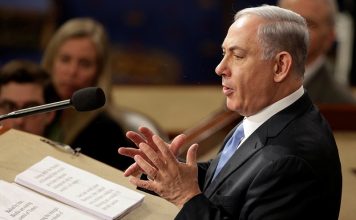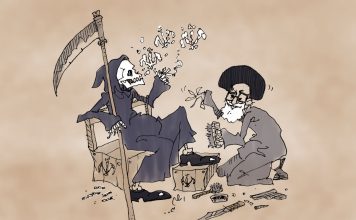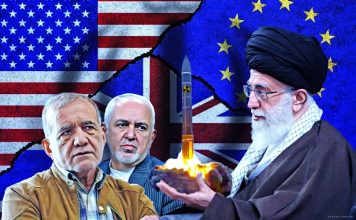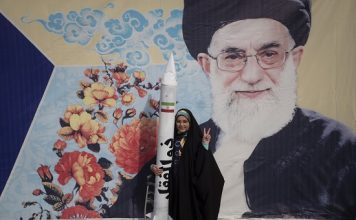By Kayhan Life Staff
According to international sources, U.S. President Joe Biden’s administration is pursuing its efforts to revive the 2015 Joint Comprehensive Plan of Action (JCPOA), the Iran nuclear deal, despite ongoing attacks by the Islamic Revolutionary Guards Corps (IRGC) on American military bases in Syria and its support for rocket attacks on Israel and its Jewish citizens.
In footage shared on social media in December 2022, President Biden said the Iran nuclear deal was “dead,” adding, “But we will not announce it. It is a long story.”
Iran’s former ambassador to France, Abolghasem Delfi, expressed the same message in an interview with the Tehran-based Entekhab online news on April 10. “All efforts to revive the JCPOA are halted, and none of the parties involved are eager to find a solution.”
Kayhan Life spoke to a U.S. State Department spokesperson about President Joe Biden’s informal remarks to reporters that “the JCPOA was dead,” asking where the talks stand now.
“The JCPOA has not been on our agenda for months since Iran rejected an opportunity for a swift return to full implementation of the deal. But what remains very much alive is President Biden’s absolute commitment to never allowing Iran to acquire a nuclear weapon and our belief that diplomacy is the best way to achieve that goal,” the spokesperson said.
“There are no negotiations between the United States and Iran, but, as we have made clear previously, we have the means to deliver specific and firm messages to Iran when it is in America’s interest to do so,” the spokesperson explained.
Prince Reza Pahlavi : ‘The Alternative to the Islamic Republic is the Iranian nation’
Biden’s critics in the U.S. and Iranian opposition forces inside the country and abroad warn that the White House’s insistence on continuing the nuclear negotiations in the hopes of “reviving the JCPOA” or the failure to confront the Islamic Republic will only harm U.S. foreign interests and embolden the clerical regime in Iran, which continues to crack down on the “freedom movement.”
It also enables the Islamic Republic to continue its military support for Russia in its war against Ukraine.
Iranian officials insist that Washington has expressed the desire to continue nuclear negotiations in a message to Tehran.
However, since the start of the nationwide anti-government protests in September in Iran, the White House and the U.S. State Department have said that nuclear negotiations were not on top of their agenda, and their focus had shifted to the protests.
Kayhan London on March 18 tweeted: “The International Atomic Energy Agency [IAEA] secret report confirmed the Islamic Republic has used some of its 60 percent enriched uranium to produce ‘molybdenum,’ bringing it a step closer to making an atomic weapon.”
The principal issue is not the nuclear talks coming to a halt but that the suspension of the negotiations allows Iran to buy time and use the stalemate as an opportunity to bypass the sanctions, sell its oil below market value to China and Latin American countries to fund its terrorist activities in the region and oppress its citizens.
OPINION: The Solution to the ‘Iran Problem’ is Regime Change
Recent events have emboldened the Iranian government, intensifying its oppression of people inside Iran.
Citing recent findings by Vortexa LTD — which analyzes freight data on global waterborne oil and gas — Bloomberg reported on April 6 that Iran exported 1.4 million barrels of oil per day (bpd), showing the most significant increase in four years.
The report also included data from Kpler — which provides information on cargo flows, inventories, and freight for 40+ commodities — that said Iran exported 1.2 million bpd to Chinese refineries in February, breaking its previous record set in 2017.
In an interview with Bloomberg Television on Jan. 23, U.S. Special Envoy for Iran Robert Malley said: “China is the main destination of illicit exports by Iran,” adding that talks to dissuade Beijing from these purchases were “going to be intensified.”
U.S. efforts have yielded no results, and China continues to buy Iranian oil. However, fearing international sanctions, Beijing refrains from investing in the Iranian oil industry.
A tweet by Kayhan London on April 15 included an undated video clip of Mehdi Nasiri, the former managing director of the Tehran-based Kayhan newspaper, in which he said: “The son of the Secretary of the Supreme National Security Council [Rear Admiral Upper Half Ali Shamkhani], who is the central player in these events, is the principal exporter of Iranian oil. He exports 40 percent of Iranian oil. Mr. Shamkhani’s son profits $1 million a day.”
“They have benefited immensely from this foreign policy [Including] their privileged children and relatives,” Mr. Nasiri alleged. “They speak about American sanctions. Many senior [officials] have described the sanctions as blessings, saying that sanctions helped us blossom. Please abandon these contradictions. The current situation has resulted from policy morphing into ideology and leaving the sphere of rationality and logic.”
Many experts warn that ignoring Iranian oil exports would only strengthen the IRGC, making it more dangerous.
Meanwhile, the U.S. claims it works tirelessly to prevent Iran from bypassing sanctions.
Speaking to the same U.S. State Department spokesperson, Kayhan Life noted that the Islamic Republic of Iran continued to export cheap oil to China or Venezuela with the help of its ghost fleet of oil tankers. It asked, apart from sanctioning oil shipping networks, does the U.S. have any maritime surveillance and security operations to disrupt the fleet?
“We are constantly monitoring Iran’s oil trade and taking steps to counter efforts to trade Iranian petroleum and petrochemical products on the high seas, but we will not detail all the ways in which we do so,” the spokesperson said.
The U.S.-based Axios news website reported on April 3, citing informed sources, that the Biden administration had spoken with its European partners and Israeli officials about a “temporary agreement” with the Islamic Republic.
Under the U.S. “temporary agreement,” Iran is to halt some of its nuclear activities, including enriching uranium to 60 percent, in exchange for easing sanctions. However, Tehran has reportedly rejected the proposal.
When asked during a recent interview what impact enriching uranium to 60 percent had on the nuclear talks, the head of the Atomic Energy Organization of Iran (AEOI), Mohammad Eslami, said: “It had a noticeable effect. When you possess a conspicuous tool, it is natural that it would affect the quality of the talks. The result is that they believe you have nuclear [capability], and they cannot eliminate that easily.”
“We can enrich uranium to any purity any time we want. It is the sign of our power,” Mr. Eslami added.
Although uranium enrichment did not help the nuclear talks to move forward, it enabled the Islamic Republic to sell its oil and meet its needs, particularly given the inaction of the West.
An informed source who wished to remain anonymous told Reuters news agency that the JCPOA was like feeding a patient intravenously, adding, “West does not want to pull out the needle from the patient’s arm. However, there is little hope for a better solution.”











